Exploring the Rich Narrative of The Witcher Game Series
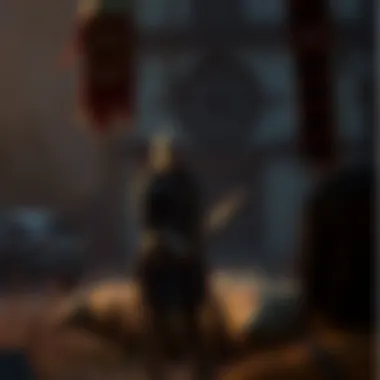
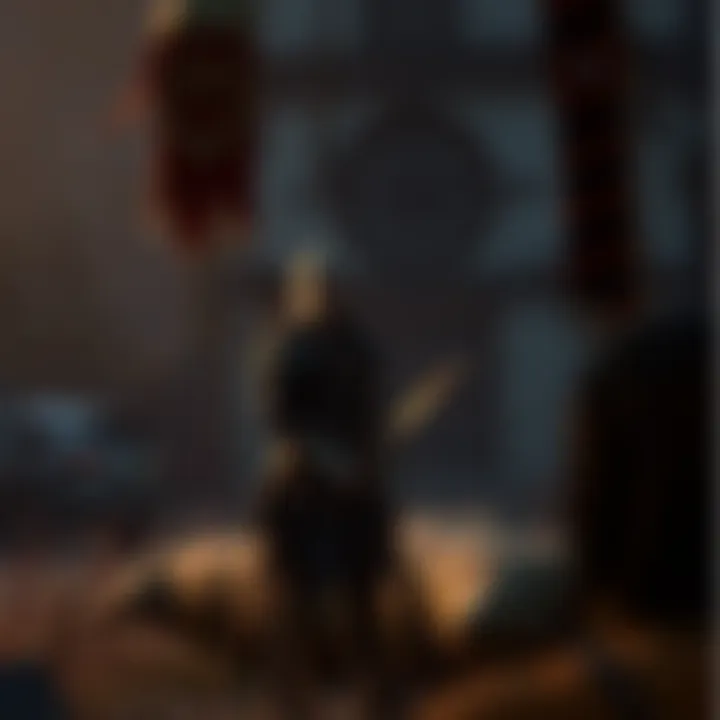
Intro
The Witcher game series stands as a towering title in modern gaming—and for good measure. With roots nestled in the rich lore of Polish author Andrzej Sapkowski's literature, the adaptation into the interactive medium has captivated a myriad of players globally. This piece sets out to dissect the various layers that formulate the vibrant tapestry of the Witcher universe, investigating not just the gameplay but also the cultural ripples these games have sent through the years.
A significant merit of the series lies in its storytelling, which mixes nuanced character development with moral ambiguity. Players don't just follow a pre-written narrative; they interact with a complex world that reacts to their decisions, creating a unique experience with every playthrough. The game escalates beyond a basic quest to slay monsters—each engagement forces players to consider the moralities at play, often pushing them to grapple with their definitions of right and wrong.
In diving into this article, expect a thorough exploration that sheds light on several crucial elements:
- The evolution of gameplay mechanics over the installments.
- An overview of the cultural impact that the series has generated worldwide.
- Insights into future developments—what's next for fans and newcomers alike.
With a structured approach, from critical updates to nuanced game reviews, this article intends to furnish readers with a profound understanding of the Witcher series' place within the pantheon of gaming. Let's embark on this journey through Geralt’s storied career, examining not just the games, but the worlds they create.
Prelude to the Witcher Universe
The Witcher universe stands as a ground-breaking realm within the gaming landscape, intricately woven with threads of mythology, morality, and the vast complexities of human nature. What makes this universe noteworthy isn't merely its fantasy setting or combat mechanics, but rather its dedicated narrative focus that immerses players in a multifaceted world. Here, characters grapple with dilemmas that are far from black and white, making choices that ripple through the story, shaping their destiny and that of the world around them.
Understanding the Witcher universe is crucial for anyone who seeks to appreciate the profound significance of the series. It's not just a tale of monsters and magic; it's an exploration of moral ambiguity, societal expectations, and personal choice. Players engage with rich narratives that demand introspection—will Geralt choose to save a monster or slay it for the sake of humanity? These themes resonate deeply, enticing players to reflect on their own moral compass.
This section aims to shed light on the origins and the literary source material that inspired the video games. Knowing this foundation enriches the gameplay experience, allowing players and connoisseurs of the series to connect dots that others may overlook. Therefore, let's delve into the origins of this captivating universe.
Origins of the Witcher Series
The inception of the Witcher series can be traced back to Andrzej Sapkowski, a Polish author who birthed this world in the form of short stories and novels. The first story, "The Witcher," was published in 1986, and it introduced readers to Geralt of Rivia, a monster hunter with extraordinary abilities, shaped by his tumultuous past and moral convictions. Sapkowski's tales draw heavily from Slavic folklore and myth, offering an authentic taste of Eastern European cultural influences.
The series garnered its initial fanbase through the written word, but it was the transition to video games that catapulted the Witcher into mainstream consciousness. CD Projekt Red, a Polish video game developer, recognized the potential for adaptation. They released the first game, simply titled "The Witcher," in 2007. It presented a blend of storytelling and interactive gameplay that resonated deeply with audiences. The game's reception paved the way for future titles, and the subsequent releases turned it into a cultural touchstone.
The resounding success of each installment is a testament to the rich storytelling and robust character development that Sapkowski initially established. As players venture through the world, they discover that the narrative is not merely an afterthought but rather the beating heart that drives the entire Witcher experience.
Overview of the Source Material
Diving into the source material is akin to peeling an onion, revealing layers that contribute to the overall narrative depth found within the games. Sapkowski’s collection of short stories, known as The Last Wish, Sword of Destiny, and subsequent novels like Blood of Elves, intricately builds the lore surrounding Geralt and his companions. This world is populated with not only monsters but also richly developed characters like Yennefer and Triss, whose complicated relationships with Geralt mirror the game’s moral quandaries.
Each narrative arc intertwines, presenting players with a literary tapestry that combines friendship, conflict, and romance. Rather than just focusing on the epic throwdowns, the stories explore emotional and ethical challenges, showcasing how personal motivations impact the larger world.
What’s compelling about these tales is how they elevate the genre beyond mere fable; they challenge readers and players alike to consider the ethics behind their actions. This depth has made the Witcher series a significant touchstone in both literature and gaming circles.
Ultimately, the blend of nuanced storytelling, ethical dilemmas, and a richly crafted world has laid the groundwork for a series that continues to thrive. With each game, players are drawn deeper into the complexities of the Witcher universe, a place where choices matter and every action has consequence.
The Development Journey
The story behind the development of the Witcher series is a testament to creativity, perseverance, and the alignment of vision and execution. The evolution of this game series mirrors the path of its protagonist, Geralt of Rivia; it has transformed through challenges, embraced growth, and ultimately emerged as a titan in the gaming industry. Exploring this development journey is critical for understanding how these titles have shaped gaming culture and influenced the expectations of players in the role-playing game (RPG) genre.
The significance of this section lies not only in recounting the chronological progression of releases but in understanding the implications of development decisions on gameplay, narrative depth, and player engagement. The journey reveals lessons learned, innovations implemented, and the response of the gaming community, which can serve as a blueprint for future developers.
Initial Releases and Reception
When the first game in the series launched in 2007, it landed in a rather crowded fantasy market. The Witcher, drawing from Andrzej Sapkowski's novels, offered a unique take on RPGs by emphasizing choice and consequence, a feature that wasn’t widely celebrated until much later. Initial responses were mixed. Some praised its rich narrative and immersive world, while others criticized its user interface and combat mechanics, which felt clunky compared to contemporaries.
Players learned about the dark and morally ambiguous world through Geralt's eyes. Many were taken aback by the rawness and grit that might not fit the typical fantasy mold.
- Positive Reception:
- Critiques:
- Intriguing lore rooted in Slavic mythology.
- Deep character relationships—even beyond Geralt.
- Combat system needing polish.
- Certain gameplay elements felt outdated or poorly optimized.
This initial mix of reception laid a foundational understanding of player expectations and set the stage for CD Projekt Red to iterate on their ideas.
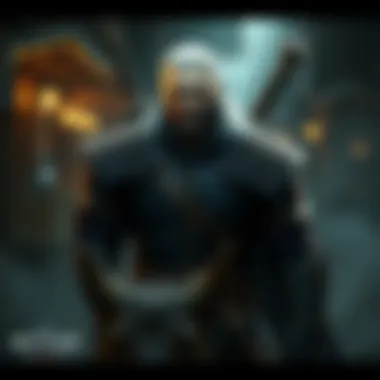
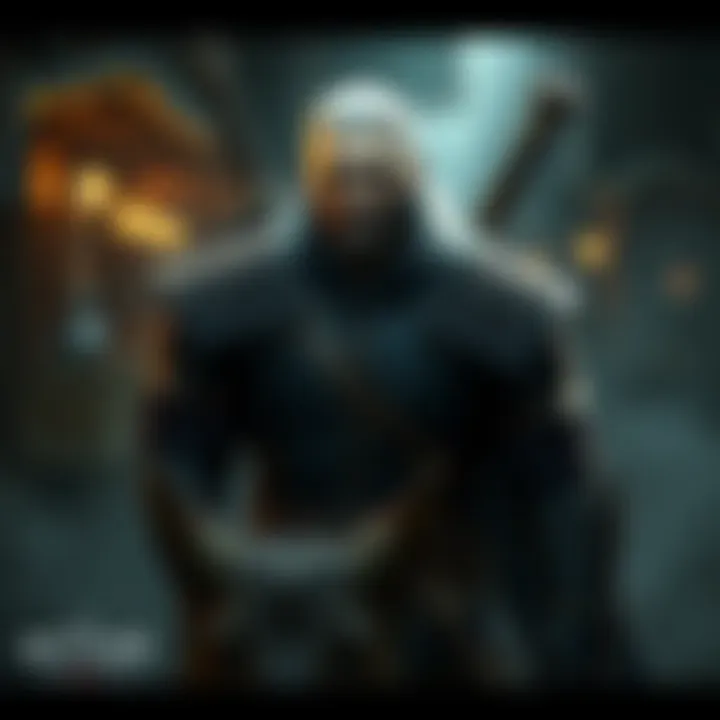
The Impact of The Witcher
Fast forward to 2015, The Witcher 3: Wild Hunt released and dramatically reshaped perceptions of what an RPG could be. This was not just a sequel; it was a seismic shift in narrative structure and game mechanics. Players didn’t just engage in quests; they became enveloped in a living world where their choices had far-reaching consequences.
Key impacts of The Witcher 3 include:
- Expansive Open World: The handcrafted landscapes were a far cry from the narrow paths of past RPGs, offering a playground rife with exploration and adventure.
- Complexity of Choices: Players faced moral decisions that often lacked a clear right answer. This depth invited discussions among players long after the game ended.
- Character Development: The growth of Geralt and a host of supporting characters resonated with audiences, enriching the narrative arc throughout all the games.
"The Witcher 3 redefined RPG standards with its rich storytelling and immersive world, setting a benchmark for future games in the genre."
While The Witcher 3 achieved commercial success—selling over 30 million copies—it also garnered numerous accolades, including the coveted Game of the Year award. This success positioned CD Projekt Red as a formidable player in the gaming industry and set high expectations for subsequent titles in the universe.
The development journey of the Witcher series is not just about the games created but how they resonate with and impact players, writing a narrative of their own in the industry."
Core Gameplay Mechanics
When diving into the heart of the Witcher game series, one cannot overlook the essential role played by core gameplay mechanics. These elements not only drive the player's experience but also set the series apart in the crowded space of role-playing games (RPGs). The Witcher series builds a unique environment where combat, exploration, and character interaction intertwine seamlessly, providing a multi-layered experience for players.
Combat System Analysis
The combat in the Witcher series often stands as a hot topic among fans, with many players appreciating its blend of strategy and visceral action. Combat isn't just about mashing buttons; it demands a thoughtful approach. Players wield a combination of steel and silver swords, tailored for different enemies—steel for men and silver for monsters. This distinction hints at the deeper mechanics at play, which emphasize the importance of preparation and situational awareness.
Moreover, each enemy type comes with its own strengths and weaknesses. For instance, when facing a wraith, using the right signs—like Igni for fiery attacks—can turn the tide in battle. The implementation of Signs adds a layer of tactical depth. They don’t only serve as spells but require players to manage their resources, combining physical prowess with magical abilities effectively. Dodging and parrying are crucial; timing your moves can be the difference between life and death. This system fosters an engaging dance of attack and defense, which turns every encounter into a memorable showdown.
One of the standout elements of combat is the instinctive enemy AI. Opponents adapt, sometimes flanking or performing combo attacks that force the player to stay alert. This setup encourages players to think on their feet rather than relying on brute force. The thrill of coming out alive after a gripping battle is unmatched.
"True mastery of combat in the Witcher series requires not just skill, but a profound understanding of your enemies and the environment."
Role-Playing Elements
The role-playing aspects of The Witcher series greatly enhance immersion and player engagement. At its core, it allows gamers to assume the role of Geralt of Rivia, a monster hunter shaped by choices, relationships, and past experiences. Each decision is not simply a line on a quest log; it branches out, influencing future events and character dynamics. This systemic choice architecture provides a sense of ownership over one’s journey.
Character customization plays a pivotal role too. Players can develop Geralt's skills through a detailed skill tree. This feature grants the ability to tailor his combat style, selection of signs, or alchemical prowess based on individual play preferences. Adding to that, the game incorporates hundreds of different gear pieces, from armor sets to unique weapons, allowing players not just to improve their stats but also to express their style in the game world.
Furthermore, character interactions go beyond quest completion. Engaging in conversations with diverse NPCs can lead to unexpected outcomes—alliances, betrayal, or even romance. Each character presents a narrative thread that enriches the story, immersing the player deeply into the Witcher lore.
In this way, The Witcher series succeeds in creating an engaging narrative experience, one driven by player choice and action that resonates long after gameplay is over. Players often find that their choices echo throughout the wider world, reinforcing the gravity of every decision made within the Witcher universe.
Narrative Structure
The narrative structure is a cornerstone in the Witcher game series, knitting together the intricate relationships and moral quandaries that define the gameplay experience. It is not just the background against which Geralt’s adventures unfold, but a living, breathing component that elevates every quest and encounter. In essence, the narrative structure imbues the game with a level of depth that few others achieve, encouraging players to invest emotionally in the outcome of every decision they face.
Character Development of Geralt
Geralt of Rivia is perhaps one of the most fully realized characters in modern gaming, and his development is meticulously woven into the narrative fabric of the Witcher series. Starting as a monster hunter with a somewhat blunt demeanor, Geralt navigates a world fraught with human and supernatural complexities. Players witness his evolution through various story arcs that probe into his personal history, relationships, and the moral dilemmas he encounters.
- Complex Relationships: Geralt’s interactions with figures like Yennefer and Triss Merigold aren't mere side notes; they shape his character profoundly. These relationships confront him with choices that impact the storyline and player perception. One moment might showcase a passionate embrace while another results in a painful split, revealing the intricacies of love and loyalty.
- Growth Through Choices: The choices players make do not just affect the story but also reflect Geralt’s gradual moral evolution. His journey through personal sacrifice, loyalty, and the weight of his decisions offer a unique lens into his character, contrasting his tough exterior with moments of vulnerability and introspection.
Each decision carries consequences that ripple through the narrative, culminating in various possible endings that resonate with emotional heft, making Geralt a character who embodies the struggle between his instincts and ideals.
Themes and Moral Dilemmas
The Witcher series isn’t shy about unearthing themes that challenge the player’s moral compass. At the heart of this narrative, players find themselves grappling with ambiguity and the murky waters of ethical decision-making. These themes are not only entertaining but serve as a lens to examine the human condition in the face of adversity.
- Moral Ambivalence: Quest lines often present situations where the right choice isn't clear-cut. For example, in the quest The Butcher of Blaviken, Geralt must decide whether to abide by his moral code or support a den of chaos, illustrating a world where decisions can lead to unforeseen and often tragic outcomes.
- Star-Crossed Fates: The game also delves into the irony of fate and choice. Characters like Ciri highlight how destiny intertwines with personal choice, raising questions about free will and predestination. Do they shape their fate, or are they mere puppets in a larger story?
Engagement with these themes ultimately invites players to reflect on their own values and judgments, enriching the gaming experience while fostering a deeper connection to the story and its characters.
"The choices we make dictate not just the narrative we shape within the game but also mirror our ideals and desires in the real world."
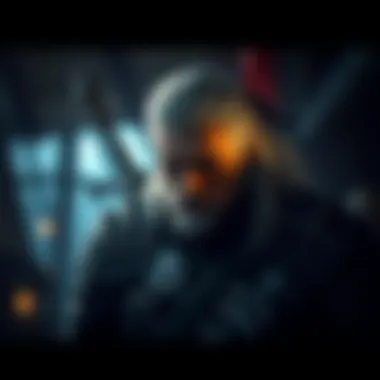
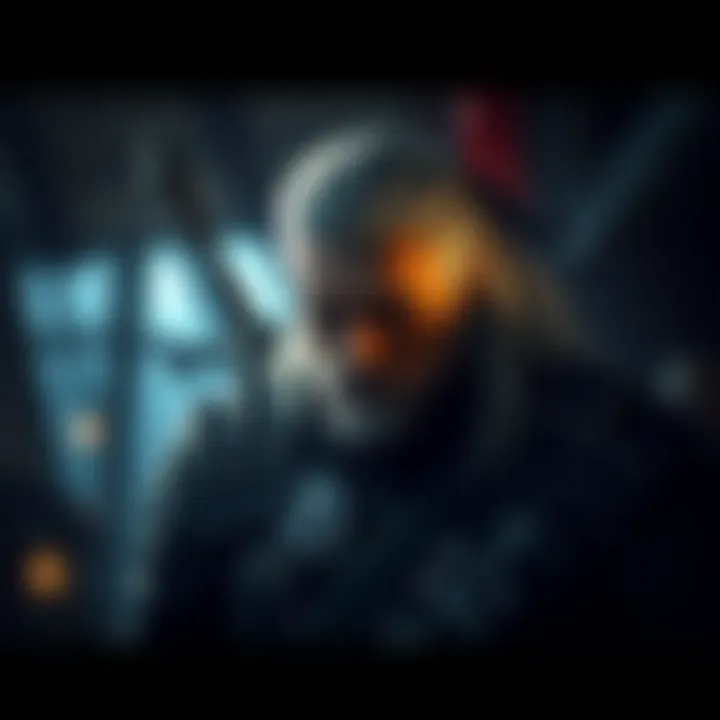
By marrying character development with thought-provoking themes, the narrative structure of the Witcher series stands as an exemplary model in storytelling, remarkably shaping both gameplay and emotional engagement for the players. Whether it’s through the complexities of Geralt’s character or the heavy themes that define his world, players find themselves wrapped in a narrative that prompts reflection long after the game is turned off.
Further reading can be found in resources like Wikipedia, Britannica, and community discussions on Reddit.
Cultural Significance
The Witcher series has undeniably carved out a niche not just as a series of video games, but also as a cultural beacon within the gaming landscape. Its significance lies in multiple avenues, including its contributions to storytelling, the evolution of gameplay design, and its community impact. As players traverse the vast realms of this universe, they aren't merely fighting monsters; they're participating in a cultural phenomenon that interrogates morality, choice, and consequence. This examination is crucial, for it informs how we understand the role of interactive narratives in modern entertainment.
Influence on Modern RPGs
The Witcher series has profoundly influenced modern role-playing games (RPGs) through its intricate world-building and deep narrative structures. Many subsequent titles in the genre have leaned heavily on the mechanics and storytelling strategies that The Witcher pioneered. Games such as Dragon Age and Cyberpunk 2077 have taken notes from the weave of choices and their repercussions, a hallmark of The Witcher’s approach to narrative construction.
- Dynamic Choices: Players are confronted with morally grey decisions that propel the story forward in unexpected ways.
- Character Complexity: Characters aren't just vessels for the plot; they have their own arcs and dilemmas that often reflect themes of humanity.
- Open World Engagement: Unlike earlier RPGs that relied on more linear progression, The Witcher series flourished in its open-world design, encouraging exploration and immersion.
All of these elements have set a new standard, urging developers to delve deeper into player agency and world interaction. The rich tapestry of The Witcher has shown that if gamers are to invest time in a world, it must be vibrant and filled with relatable struggles.
Community and Fandom
The Witcher boasts a fervent community that extends beyond just playing the games; it thrives on discussions, fan art, and even cosplay. Platforms like Reddit and various forums have become hotbeds for fans to discuss theories, share experiences, or simply show their admiration for the series.
- Content Creation: The enthusiasm of the fanbase has led to an abundance of fan-generated content. From YouTube analyses to Twitch gameplay, fans contribute actively to the larger dialogue surrounding the series.
- Celebrations and Conventions: Events like WitcherCon have been organized where fans come together to celebrate the lore and creativity surrounding the Witcher realm.
- Merchandise and Adaptations: The series' expansion into television and comics, like the acclaimed Netflix adaptation, has further solidified its cultural impact, as new audiences discover Geralt's adventures.
This community has transformed the gaming experience into something more than just play; it’s a shared journey. The discussions around moral choices, character development, and world-building create a layered understanding among fans, enriching their experience well beyond that of mere gamers.
"The Witcher isn’t just a game; it’s a community, a culture, and a shared universe that goes beyond the screen."
In contemplating the cultural significance of The Witcher, one can’t help but appreciate how it has shaped not just gaming, but broader media narratives. By intertwining complex narratives with a solid community foundation, the series presents itself as a touchstone for both gamers and narrative enthusiasts alike.
Visual and Audio Design
In the realm of video games, visual and audio design can transform an ordinary experience into an extraordinary one. For the Witcher series, the importance of these elements cannot be overstated. The rich visuals and immersive soundscapes serve not only to beautify the game but also to enhance storytelling, evoke emotions, and build a compelling world. By marrying graphics and audio, the game crafts a distinctive ambiance that draws players into its narrative.
Art Style and Graphics Evolution
The art style of the Witcher series stands as a testament to its commitment to visual storytelling. Initially, with the first game release, the graphics were standard for the time but laid the groundwork for a universe that would evolve significantly. The transition to The Witcher 2: Assassins of Kings showcased a dramatic improvement. Here, CD Projekt Red adopted a more mature and detailed visual style, with environments that felt both rich and authentic. The use of a distinct color palette not only reflected the tone of the narrative but also helped to immerse players in a world rife with history, conflict, and magic.
By the time The Witcher 3: Wild Hunt graced screens, the graphical fidelity reached new heights. This installment displayed intricate details in character models and sprawling landscapes. Elements like dynamic weather systems and day-night cycles added layers of realism, contributing to the liveliness of the environment. Each region feels unique, from the sunlit fields of White Orchard to the dark, swampy confines of Velen, ensuring that players are never taken out of the experience.
Moreover, the graphical fidelity is not merely a showcase of capability but serves to amplify gameplay mechanics. Subtle animations, such as the sway of grass or the flicker of firelight in a tavern, help to anchor the player’s immersion in the Witcher world. Developers made strategic choices in animations to reflect character actions too, enhancing emotional connection.
“Visuals in a narrative-driven game like the Witcher are not just about aesthetics; they are pivotal to how players engage with the story.”
Soundtrack Significance
The soundtrack of the Witcher series plays an equally critical role in shaping gameplay experiences. From the bold, stirring compositions during combat to the ethereal melodies of peaceful moments, the music amplifies every facet of the gameplay. Composed by a team led by Marcin Przybyłowicz, the scores are meticulously crafted to evoke the feeling of grandeur while maintaining an earthy tone that aligns with the game’s medieval fantasy setting.
The integration of sound effects is another layer that enriches the player’s engagement. The sound of a sword slicing through the air, the growls of monsters lurking just out of sight, and ambient sounds like rustling leaves or distant animals contribute to the believability of the game world. These meticulously recorded sounds work in tandem with the music to create an immersive atmosphere.
Players often remark that the music lingers even after they put down the controller. Memorable tracks evoke strong emotions, reinforcing the successes, tragedies, and moral dilemmas faced throughout the journey. This connection between audio and player experience highlights how a well-composed soundtrack can elevate the emotional stakes of gameplay.
In summary, both visual and audio designs are not mere embellishments in the Witcher series; they are fundamental components that shape the essence of the experience, creating an intricate tapestry that resonates deeply with players. For those who venture into the Witcher universe, the marriage of graphics and soundcraft paints a vivid picture that lingers long after the game ends.
Comparative Analysis
In comparing the Witcher series to other RPGs, one understands the specific niche this franchise occupies within the broader gaming landscape. The analysis often highlights the unique elements that set it apart from competitors, illustrating its significance in the gaming community. One key benefit of this comparative examination lies in its ability to showcase the evolution of gameplay mechanics and story-telling approaches. This not only enhances appreciation for the series itself but also aids players in discerning what qualities they value in an RPG.
Witcher Series Versus Other RPGs
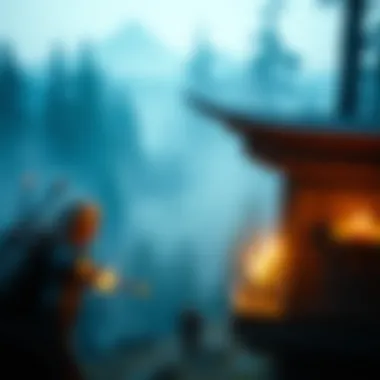
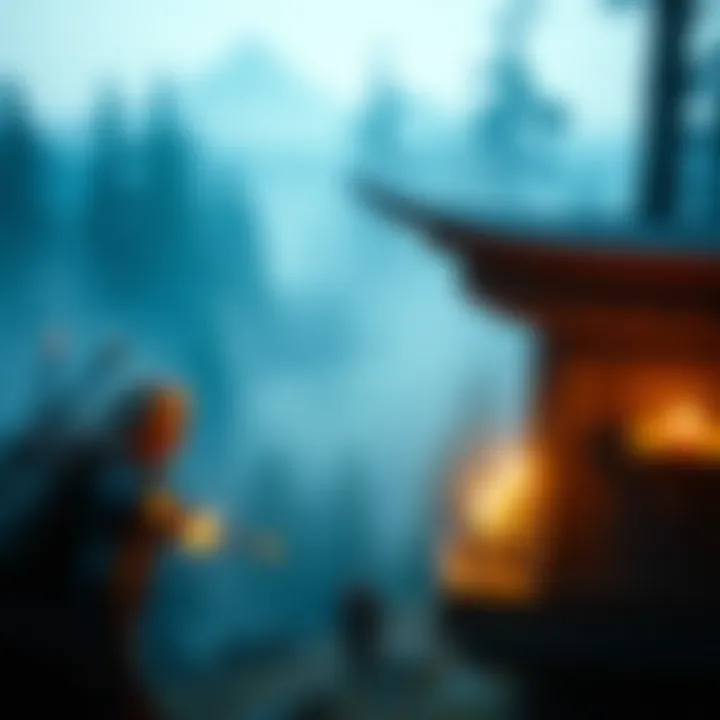
The landscape of role-playing games is as varied as the hearts that enjoy them. The Witcher series stands tall, offering intricate storytelling, well-crafted characters, and immersive gameplay. Unlike many RPGs focusing primarily on combat mechanics or vast open worlds, the Witcher pivotally invests in player choices that yield significant narrative consequences.
- Character Depth: Geralt of Rivia, the series' protagonist, epitomizes the depth found within the Witcher universe. His moral complexities and development are contrasts starkly with many other RPG heroes, who sometimes remain archetypal and less engaging. In the Witcher, players face genuine dilemmas, not just simple "good" vs. "bad" choices.
- World-Building: The world of the Witcher, rich in folklore and political intrigue, is brought to life far beyond mere mechanics. Cities like Novigrad and the rural areas of Velen are more than just backdrops; they are living ecosystems filled with unique lore, quests, and vibrant cultures. Many RPGs offer expansive worlds but struggle to imbue them with the same level of life and consequence.
- Narrative Design: The incorporation of side quests that often rival main story arcs in significance is a hallmark of the Witcher games. These quests deal not just with combat, but also with ethical challenges, personal stories, and branching paths—elements not always found in contemporary RPGs.
In summary, the Witcher series is not just another RPG; it redefines the genre's potential, elevating it to a level where storytelling and character arcs compete with its gameplay elements.
Adaptations in Other Media
The impact of the Witcher series stretches far beyond the gaming console, making significant footprints in other media forms, owing to its rich lore and engaging characters. The transition from games to television and literature has opened doors for countless fans and newcomers alike to dive into this universe.
- Television Adaptation: The Netflix series, featuring Henry Cavill as Geralt, expanded the Witcher’s reach, captivating audiences skeptical of video game adaptations. This adaptation respects the source material while also making it accessible to an audience unfamiliar with the games. Character dynamics, intricate political landscapes, and the moral implications of choices made by Geralt lend depth to the series.
- Literary Success: The original Witcher novels by Andrzej Sapkowski serve as an undeniable foundation that enriches each adaptation. These stories introduce readers to the profound themes of destiny, love, and the perpetual struggle between good and evil, making them a must-read for fans wanting to understand what shapes the franchise.
- Merchandise and Spin-offs: The adaptations have led to a rich market for collectibles, comics, and board games. This broadened scope fosters community engagement, creating avenues for fans to interact with the lore more intimately.
"The Witcher isn’t just a game, but a living world that continues to evolve, bridging gaps across various media."
As this franchise continues to develop across multiple platforms, it remains crucial to assess these adaptations, considering how they both honor and transform the original material, further establishing the Witcher's legacy in popular culture.
By undertaking this comparative analysis, one gains insights into why the Witcher series shines distinctly among its peers, all while growing into new and exciting territories beyond traditional gaming.
The Future of the Witcher Series
Looking ahead, the trajectory of the Witcher series holds considerable promise, not only for existing fans but also for those who are yet to discover this richly constructed universe. The recent endeavors within the franchise signify a robust dedication to evolving game design, narrative depth, and cultural relevance. This section sheds light on the new ventures and storytelling possibilities that will further shape the series as it continues to evolve.
Upcoming Projects and Expansions
CD Projekt Red has made it clear that they are determined to develop new stories set within the Witcher realm. Notably, there are plans for expansions that promise to enrich the player experience further. The company plans to explore new narratives that take place in different regions of the Continent, considering geographical and cultural influences seen in previous installments.
Some potential expansions may include:
- A Return to Kaer Morhen: As a pivotal location in Geralt's story, revisiting this stronghold could allow players to dive deeper into the history and lore of the Witchers.
- New Witchers: Introducing fresh characters could offer different perspectives and quests, creating a broader narrative spectrum. These characters may include other Witchers from various schools, each bringing unique abilities and philosophies to gameplay.
- Multiplayer Features: Considering the growing interest in cooperative gaming, a multiplayer component could emerge, allowing players to tackle quests together, taking advantage of unique character abilities.
- Remakes or Remasters: With the original Witcher game celebrating significant milestones, a remaster could not only bring in modern graphics but also tighten up gameplay mechanics that have evolved since its initial release.
The mention of these upcoming projects stirs anticipation among the fans while emphasizing the developers' commitment to quality storytelling and immersive environments. These expansions aim to provide not just additional content but a deeper connection to the existing lore.
Potential Directions for Narrative
As the Witcher series looks to expand its storytelling, several thematic elements are ripe for exploration. A crucial factor in preserving the series' essence while delving into new territory will be balancing player agency with crafted narrative arcs.
Potential directions for future narratives might include:
- Exploration of Moral Ambiguity: Continuing to tackle tough moral dilemmas can present players with choices that don't yield clear good or evil outcomes. This complexity is a signature of the series.
- Political Intrigue: With the Continent filled with various factions, it would be intriguing to see how political tensions evolve, especially with the power vacuum resulting from previous events.
- Feminist Perspectives: Unpacking the roles and stories of women in the Witcher universe could enrich the narrative landscape, presenting diverse character arcs and experiences.
- Mythical Creatures: New creature lore can expand the mythical elements of the story. Introducing entirely new monsters inspired by various cultures' folklore can pique the interest of seasoned players and newcomers alike.
Ultimately, the future narratives must reflect the series' core values: rich storytelling intertwined with engaging gameplay and character development. CD Projekt Red has shown great dexterity in weaving together these elements, and there is reason to believe that the best is yet to come.
"Innovative storytelling in gaming comes not just from the narrative alone but how the story interacts with the gameplay experience."
As we gear up for these exciting ventures, the Witcher series is poised not just to continue but to thrive, showcasing the timeless allure of its world while adding fresh chapters to its saga, ensuring a legacy that resonates for years ahead.
Culmination
The conclusion serves as the final cog in the wheel of understanding the remarkable journey of the Witcher game series. As we wrap up this exploration, it's paramount to highlight the various facets discussed previously.
Summary of Insights
Throughout this article, key insights have been shared about the Witcher universe, each revealing layers that contribute significantly to its allure. From its roots in literature to the complex gameplay mechanics, the series has shown itself to be an evolving entity that adapts and thrives in a dynamic landscape. It's not just about parsing quests and collecting loot; it's about immersing oneself in a world rich with narrative. The relationship between life choices and game outcomes creates a morally ambiguous playground that keeps players coming back for more.
Here are some focal points from our discussion:
- Origins: The narrative backstory provided a solid foundation for the subsequent games, meshing seamlessly with character arcs and plotlines.
- Gameplay depth: A robust combat system coupled with RPG elements allows for extensive customization and personal storytelling.
- Cultural impact: The Witcher has not only influenced gaming but also carved a niche in mainstream media, solidifying its status in modern culture.
- Future prospects: With upcoming expansions and new projects, the Witcher series is poised to continue surprising and engaging its devoted fanbase.
Final Thoughts on the Witcher Legacy
In wrapping up, the Witcher legacy serves as more than just a powerful franchise in the gaming sphere. It's a rich tapestry of storytelling, creativity, and community engagement. The Witcher games have established benchmarks not just for RPGs but for all forms of narrative-driven media. Geralt of Rivia’s journey resonates with players on multiple levels, symbolizing the appeal of deep character-driven stories. As we look ahead, the anticipation for what lies next in the Witcher saga is palpable. The lesson learned here is clear: the witcher is not merely a trend; it embodies a timeless quest for connection, empathy, and understanding within a beautifully flawed universe.
"In the world of The Witcher, choices matter, and every decision weaves into the larger narrative of existence."
Through the commitment to storytelling, the series has not just created games; it has fostered a community, crafting a kind of loyal following that champions not just gaming, but also profound engagement with the stories that shape our understanding of morality and choice.



